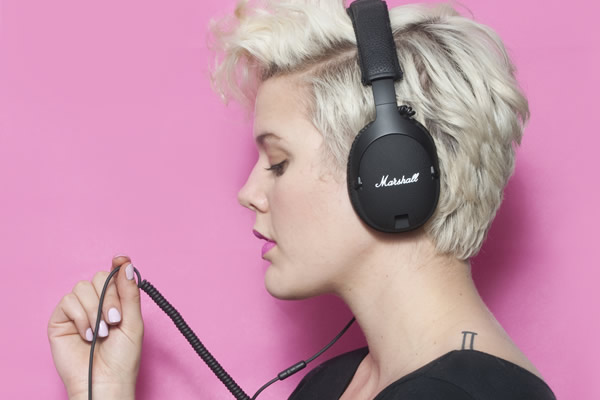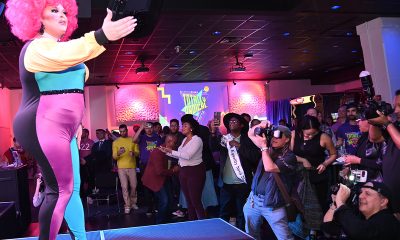a&e features
Main stage mayhem
This year’s headliners are up-and-coming hit makers

Capital Pride Festival
Capitol Main Stage
Pennsylvania Ave. between 3rd and 7th streets
Sunday
Noon-7 p.m.
Betty Who’s song “Somebody Loves You” went viral when it accompanied the YouTube video that featured a gay marriage proposal set to a flash mob in a Home Depot in Utah. The 22-year-old Aussie native has two EPs out and is working on her first full-length album.
Karmin is 28-year-old musical and personal partners Amy Heidemann and Nick Noonan known for their No. 1 Billboard Dance Chart hits “Brokenhearted” and “Hello.” Their debut album “Pulses” was released in March.
And Bonnnie McKee, 30, has written a monster string of hits for artists like Katy Perry, Britney Spears, Ke$ha, Christina Aguilera, Kelly Clarkson and more, eight of which have gone to No. 1. Last summer, her breezy song “American Girl” inspired a 7-Eleven-set video and she continues to work on a debut album.
They’re three of the acts headlining on the Capitol Stage at the Capital Pride Festival Sunday. We caught up with them by phone from Los Angeles — where all happened to be at the time — this week. Their comments have been slightly edited for length.
BETTY WHO
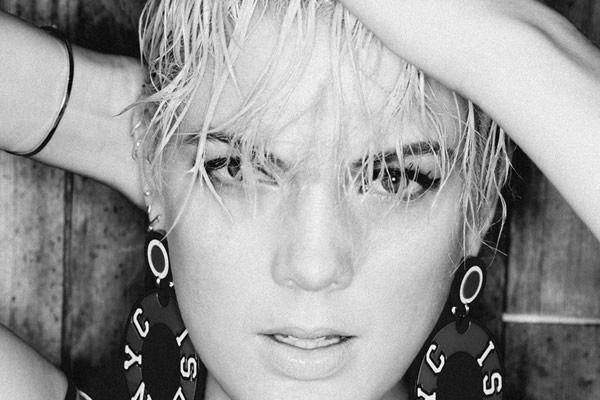
Betty Who (Photo by Shane McCauley)
WASHINGTON BLADE: Spencer and Dustin, the guys in the Home Depot video, said they wanted you to sing at their wedding? Has that happened yet?
BETTY WHO: Yes, I sang at their wedding in Utah in February and it was like the most perfect, beautiful day of my life. I can’t imagine my own wedding being any more perfect.
BLADE: How did you feel when they asked you?
BETTY: They are the most sweet, amazing men in the world. It was just one of those days where I thought, “I could not be doing anything better with my time. My boyfriend played guitar for me so it was kind of very sweet the two of us. I sang an acoustic version of “Somebody Loves You” as their moms walked them down the aisle so it was kind of this beautiful small moment in time.
BLADE: How did it come about that you developed such a strong gay fan base?
BETTY: I’ve always been supportive, but you know, I didn’t set out initially to have that as part of my platform, though I always knew I would support gay rights. It just so happened when I put out my first EP, that the first few bloggers who picked up on it were these gay pop music blogs in New York, so it kind of worked out perfectly that my biggest demographic is LGBT. I’ve just spoken up for what I feel is right.
BLADE: Did you know gay people growing up?
BETTY: Our next door neighbor was my mom’s best gay friend and his partner, so I have definitely been surrounded by a very kind of wholesome and well-rounded community my whole life and it’s always been this wonderful thing, gay, straight, bisexual, transgender, whoever it was, it didn’t really matter. I was never taught to think of anybody differently. Then I got a little older and I had friends who came from very conservative backgrounds and I was confused as to why they thought that being gay made you different. I just didn’t get it. It was funny, it wasn’t about becoming open minded but putting myself in the shoes of people who were less open minded and going, “Oh, like not as everybody was as lucky as me to have this great experience and this really kind of you know urban community I guess. I grew up in the middle of Sydney, so I had always been around everybody.
BLADE: Have you done many Pride festivals?
BETTY: This will be one of the first ones. I’m doing this little tour through June called the “Hopeless Romantic Tour” and I think something like 80 percent of the shows are Pride festivals. It will definitely be very fun and wonderful and drunk, I imagine. I play Los Angeles, then Salt Lake City, then D.C. on Sunday. So that will be my first one on Friday.
BLADE: Do you know how long your set will be?
BETTY: I’m not sure. I think maybe 30 or 45 minutes.
BLADE: You mentioned singing at the wedding with your boyfriend. Is that Peter Thomas, your collaborator or someone else?
BETTY: No, people ask me that all the time. He’s a good friend, but this is somebody else.
BLADE: Often you don’t really hear accents much from British and Australian singers. In your songs, your accent is there. Is that a conscious choice?
BETTY: It was definitely a choice because I think even Adele sometimes, she sings and you don’t hear her accent. So much about being a star today or a popular artist in the industry is about dong what makes you different and what makes you special and to me I always thought being Australian was something that definitely made me different. And I never wanted to suppress that part of who I am and where I came from.
BLADE: I know you’ve been in the U.S. since you were a teen so you may not know, but do you think it would have been harder to break a pop career in Australia than in the U.S.?
BETTY: I think being a really famous person in Australia is actually much harder than to come over to America and make a go of it. I remember all of these really famous and beautiful singer/songwriters that I loved growing up and then I came over to America, only a handful of my friends knew about them. I thought, “What do you mean she’s like the most famous person in Australia, what do you mean you don’t know who she is?” So I think because it might be different now because the internet has made such a difference. Spotify wasn’t really a thing and Pandora was just sort of starting to be popular, so I think that it’s probably a little bit different. It looks easier and made more sense for me to start my career from the ground up in New York and have my biggest demographic of fans be there.
BLADE: Did you and Peter realize you had musical chemistry immediately?
BETTY: I think he and I have always been musical soul mates. When we met we were like, “Oh My gosh, we like all the same music, this is perfect.” Surely we knew as friends and creative partners we knew we would be great together. I remember being at a party at his house and he was in charge of the playlist and I was like, “Every song on this is a smash. …Who is this person, we are destined to be musical friends,” and it ended up being Peter. So I think that was really easy and was very immediate but it took us almost three years to write music that we knew was perfect or to get it to a point where we didn’t think, “Oh, we should keep rewriting it.” When we wrote “The Movement” EP, that was the first body of work that we put together and said, “Oh my gosh, this is it, this is how we meant to do it,” all of that. I think in that process we had been working together three years.
BLADE: When you get to that point and find pop songs that work, do you feel you’ve cracked a code in a sense?
BETTY: I think it is kind of like we cracked a musical code. We had been writing an working together so long that at some point you just work together so well and you understand each other so well and so deeply that you are like, “We have to put this here, that worked on this song so it will work here.” …When we’re writing a song now, if there’s something that’s not working, we can say exactly why it’s not working. And what we need to change, or if it’s going really well we know why and we know how to keep it going.
BLADE: Do you still play cello?
BETTY: I do, but not in public. Just kind of on my own in my bedroom.
BLADE: Did you initially plan a classical career?
BETTY: I was at a classical high school Interlochen Center for the Arts in Michigan and when I left I had only applied to colleges for voice and songwriting. So I knew when I was leaving I wanted to go into pop, but it definitely took me a second to kind of get out of that mind frame. Because I remember my first two semesters at Berklee (College of Music in Boston), I performed more playing cello for other people than I did singing my own stuff. So it took me kind of about a year at Berklee to figure out I definitely didn’t want to keep playing cello for other people and I definitely want to be singing on my own and doing that.
BLADE: Are you planning a full-length album?
BETTY: Yes, I am currently working on it actually. We hope to have it out sometime in the fall.
BLADE: Was “Somebody Loves You” particularly hard to write?
BETTY: The verses and chorus were done, like, in a night. But we didn’t have a bridge. I didn’t worry about it. We were in the middle of a semester and we didn’t have anything out, nobody knew who I was, so I took a break from it for a couple months. We had written it in, like, February, then when we went to record it in summer, I remembered, “Oh, I need to sit down and write this bridge” and I wrote it in like 10 minutes. …I think because we gave it so much space, the song as a whole kind of just worked because there was no pressure. But it wasn’t ’til we recorded it that we were like, “Oh fuck, this is amazing and we love it and feel really passionately about it.”
BLADE: You’re straight, right?
BETTY: Yes
BLADE: Do you have a gay best friend?
BETTY: Several, from all walks of life. My gay friend from college, from high school, from childhood. I kind of have a bunch of gay friends that have kind of all come to know and love each other which is perfect.
BLADE: Is Peter straight?
BETTY: Yes, to the dismay of many of gay best friends.
BLADE: Is your family mostly here in the U.S.?
BETTY: It’s kind of split. My mom is American and my dad is Australian so my dad’s whole side is there but he and my mom and her side are all in America.
KARMIN
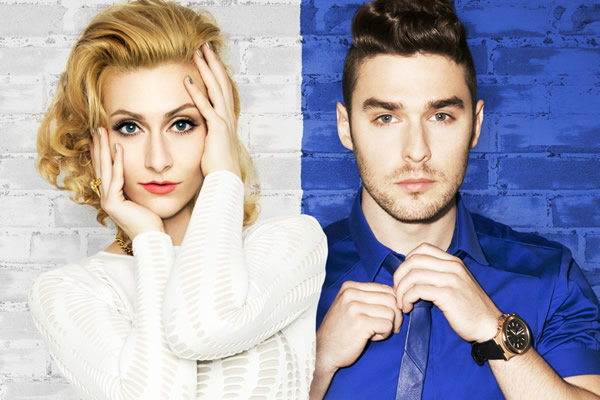
Amy Heidemann and Nick Noonan of Karmin. (Photo courtesy of Epic Publicity)
BLADE: How long have you been rapping, Amy?
AMY HEIDEMANN: I want to say I’ve been free styling on the streets of Nebraska since I was a little girl, but that’s not the case at all. I was raised in a super Christian household so I wasn’t allowed to listen to most rap music that I love today, but I was able to sneak you know a couple burned CDs I got from school from my classmates. So I did learn to rap sort of on accident. I was practicing to be a singer and the rapping came later.
BLADE: You two met at Berklee (College of Music in Boston)?
NICK NOONAN: Yes.
BLADE: Were you planning a pop career then?
NOONAN: We were kind of all over the place. I was originally a jazz trombone player, believe it or not.
HEIDEMANN: I always had dreams of being an R&B superstar. My favorite singer growing up was Brandy. We started out more indie and kind of hipster when we were doing the covers and the pop thing just sort of happened. I don’t know if it was really intentional, but it’s been awesome.
BLADE: But do people go to school to study pop music?
HEIDEMANN: Actually it’s weird because at Berklee they kind of do. There aren’t many schools like it, maybe one in California. But yeah, like, they have hip-hop classes. I think the place Jessie J and Adele went to in London I think is really comparable.
BLADE: Did you immediately realize your musical camaraderie?
NOONAN: No, it took a minute. We were both doing music independently from each other and then after we graduated we decided to start the group.
HEIDEMANN: We literally had to learn new instruments.
NOONAN: Yeah, Amy started to rap and I started playing piano and she was playing guitar. It kind of started from the bottom up.
BLADE: Did you start dating first or making music together?
NOONAN: Dating.
HEIDEMANN: Yeah, dating three or four years before.
BLADE: What’s your current relationship status?
NOONAN: We’re still engaged and trying to figure out the marriage thing.
BLADE: Are you concerned that if things continue going well for you musically, there could be a Fleetwood Mac-type impassion on the personal front or are you far enough into it now to not worry about that?
NOONAN: That’s always kind of on our minds but honestly we’d been dating and knew each other so well before we got any attention that it was kind of like all the skeletons were out of the closet before. So there really isn’t much to hide anymore.
BLADE: “Brokenhearted” and “Hello” were both No. 1 dance hits. Did you realize you were onto something writing them as opposed to other songs?
NOONAN: We did know pretty early on. Even with the covers, the strongest thing for us is playing live, so we knew that if we had some kind of energy, some feeling to get behind and get on stage and play this, there are certain songs that have an energy there and really translate well live and that’s our biggest thing. We wanted to make sure that those songs had those elements. When it feels really good, feels right, usually those write themselves and they are a lot faster to write.
BLADE: Did you realize early on you had a strong LGBT following?
HEIDEMANN: Yeah, it was pretty early. I used to put the covers up and we used to read every single comment, which can be really bad because people can be super mean. But the gay audience early on, there was a lot of guys who were commenting on Nick’s attractiveness. We were kind of like, “Oh, this is awesome.”
NOONAN: We have a very theatrical performance style, there were kind of a lot of elements. We didn’t really go out trying to say, “OK, we’re going to go get the gays,” but it made sense and we started doing a lot of Pride festivals and you know how we feel about everything, it’s more of a civil rights issue for us. So it kind of just made sense.
HEIDEMANN: And those are the best shows. So we were kind of like, “Why are we wasting our time playing anywhere else?”
BLADE: People are more relaxed at Pride events?
NOONAN: It’s just a completely different freedom and we’re able to feel that on stage, so they’re great shows.
BLADE: How so?
NOONAN: More celebratory, probably. The energy is more …
HEIDEMANN: Free
NOONAN: Free, I guess. We just did our first headlining tour and there actually was a lot of energy, we were kind of blown away, but still the Pride festivals, even if they didn’t know who we are, or people say, “I never heard of you before today,” they’re still — they want to love us, you know what I mean? That’s a very cool energy.
BLADE: How long will your set be at Capital Pride?
NOONAN: I don’t know. If it was up to us, it would be about 75 minutes, but I think we’re told maybe 30 or 40. So I don’t know.
BLADE: Your act obviously has gay sensibility. Was that something natural from your personalities, fashion sense and all that or did you play it up more when you started realizing you had gay fans?
HEIDEMANN: Definitely the first thing you said. Like I said, we had no idea that would be who we attracted, but that’s how we’ve been in our blood, in our veins, I’m very theatrical in my style. Fashion is incredibly important to me. We have this monochromatic thing. Even when you walk in our closet, it’s like a rainbow. Everything is organized by color so we didn’t really see it coming, but it’s the perfect fit, so it’s all worked out great.
BLADE: Why do you think LGBT rights are important?
NOONAN: Being gay is not new. it’s been around since the beginning of recorded history. It’s just a natural thing for us. Just kind of how we were raised and stuff to not see race or difference in religion to see people. … We really try to not have any of that stuff in our brains at all. … It’s crazy and very very cool how far it’s come in the last 10 years.
HEIDEMANN: Even four years ago. In my high school, there was only one guy who was semi-out. And it was like this huge taboo thing. I’m from the midwest. So it was super religious and pretty scary. I had a family member who came out recently and it was a struggle. So it is personal to us, but also exciting to be part of such an important part of history. And I know we’re going to be looking back and telling our kids about it and they’ll be like, “Really? Why would you ever discriminate against anyone?”
BLADE: You were born just a few days apart. Is there any astrological significance to that or is it just a random factoid?
NOONAN: It’s funny because we just went to an astrologer like last week. But we won’t go into that. We are both Tauruses, so there’s a lot of creativity but also a lot of stubbornness. Usually we get along very well, but when we butt heads, it’s like a colossal shitstorm.
BLADE: You said your parents were conservative, Amy. How are they now with what you’re doing?
HEIDEMANN: My parents are strict but they’re much better now. I know at the beginning it was a little stressful being from a little small town of 7,000 people, everybody is constantly asking about us, my parents are very protective and sometimes really worried about the stuff we encounter, but it’s getting easier. For a long time, it was hard for them to read like critical reviews of our music but it’s starting to become more of the norm I guess.
BLADE: Now that you’ve had a few hits, what’s your opinion of what it takes to break through on the U.S. pop landscape?
NOONAN: It’s mainly persistence. You look at the people now who are superstars, Lady Gaga, Katy Perry, they bounced around from label to label for years before they had any success so persistence is definitely one of the biggest things. It is not the most talented people, it is not the best singers. It can help you for sure, but it does not guarantee you a damn thing. So that’s one of the things about the industry, you know, for us. We’re just now starting to semi hit our stride.
BLADE: I know your album is still pretty new. What’s next for you? More singles from that? What will you be doing the rest of the summer?
NOONAN: We’ll hopefully have more information for you soon but we’re always kind of writing and working on new music and obviously touring a lot.
HEIDEMANN: The album just came out and then we went on tour really quickly so it’s all really still fresh for us. There had been a lot of delays with the record label.
BLADE: Is your appearance at Capital Pride a one-off or are you playing a couple Prides this year?
HEIDEMANN: We’ll be with you guys, then a couple dates in the midwest, then we’ll come back. It’s like a week-long mini-tour.
BLADE: Was there a tradeoff in signing with a major label?
NOONAN: It’s difficult, definitely.
BLADE: How so?
NOONAN: Just getting everybody on the same page.
HEIDEMANN: There’s a lot of turnover. You’ll work with a lot of different people, then they might move on to another company.
NOONAN: Differences of opinion. We’re not big fans of art created by committee.
BONNIE McKEE
BLADE: You just toured with Karmin this year, right?
McKEE: Yes, I’m excited to be reunited with them again. We did five weeks together and it was amazing. So much fun. They’re a really fun act and they have a great audience.
BLADE: Did you get to hang out much on the road?
McKEE: I knew them before. We had written songs together and we’re label mates, so it was fun.
BLADE: Was the “American Girl” video really shot in a 7-Eleven?
McKEE: It was actually an AMPM, but it was a quickie mart. We wanted to give some love to 7-Eleven, but they weren’t with me on that.
BLADE: You didn’t have to get permission to use Slurpee in the song?
McKEE: I never got a call about that.
BLADE: Obviously I know you could be playing a character in a video or even if it’s you, that’s not your entire persona, but the video presents you as this carefree girl sunbathing, changing clothes in a car wash and so on. Yet being a pop singer takes enormous work and discipline. Does your real life feel removed from that girl?
McKEE: I’ve been trying to take more time for myself recently. When you’re on tour, yeah, it’s a blast of course, but it’s also a lot of hard work. I’m trying to let myself be a little more carefree like the girl in the video.
BLADE: There was talk of you having an album out this spring. The first single was out last summer. What’s the status of that?
McKEE: Well, I want to do some more visual stuff. I’ve made a couple videos, I just put a single on iTunes and I’m also trying to sell “Sleepwalker” which I never officially put out. …So I don’t know when it’s going to happen. It’s all about timing, so when we get it set up properly, it will be out. I’m really a visual artist, so I think videos are really my sweet spot.
BLADE: Has there been label pressure to have a decent hit before putting the album out?
McKEE: It’s really up to them. I’m just showing up and playing for the people who want to hear me play. They’ll figure it out when they’re ready.
BLADE: How did you meet Katy Perry?
McKEE: At a thrift store in Los Angeles. We were both trying to sell our clothes and being rejected, so we kind of bonded over that and we’ve been friends ever since.
BLADE: When was that?
McKEE: Oh, maybe 10 years ago.
BLADE: When you write together, do actually sit down together or just send ideas back and forth?
McKEE: We it down in the room together, do a lot of spooning. We get in a bean bag chair together and kind of hash it out. We fight a lot over every line but that’s what makes it great. She’s a perfectionist and so am I.
BLADE: You’re friends too? You hang out?
McKEE: Yeah, when there’s time and if we happen to be in the same city, definitely. She always has extravagant birthday parties.
BLADE: Has your classical training growing up come in handy in the stuff you do now, like with knowing chord progressions and stuff like that, or is it apples and oranges musically?
McKEE? Really grateful to have the training I have but it doesn’t help much. I think the only way it really comes into play in my pop songwriting is, you know, keeping my voice healthy and knowing how to sing properly and not injure myself. That was the most valuable thing I learned. And also work ethic. It was just drilled into us in a world class choir. We were yelled at a lot. Really prepared me for real life.
BLADE: Some of the other acts who’ll be at Capital Pride who are eking out pop careers also had classical training. Do you think that’s just a coincidence or does the general rigidity of classical music make some people want to bust out and go crazy with fun pop stuff?
McKEE: I don’t know. Maybe the ones that are have had training, but so many just have the natural instinct and never had a lesson in their life.
BLADE: Did you always love pop music?
McKEE: Yes, always. I used to get in trouble because I’d have a solo and I’d sing it in a completely pop voice and they said, “You can’t sing like that in choir.” Well, why not? I didn’t know I was a pop singer until people started telling me that.
BLADE: Who were your favorite singers when you were 13, 14 or 15?
McKEE: I loved Whitney Houston, Fiona Apple. Mariah Carey of course. I really liked the divas. And Carole King. She was kind of the first person where I realized songwriting was something you could make a living doing and how important it is for the message to be coming from the artist.
BLADE: You identify as bi, right?
McKEE: Yes
BLADE: At the moment, though, you’re dating a man?
McKEE: Well up until a few years ago. I’m not seeing anyone now.
BLADE: Do people ever accuse you of saying you’re bi just to have street cred or something or do they take it seriously?
McKEE: I think it’s ridiculous. Do I have to prove to everyone that I’m bisexual? They want me to make out with girls publicly to prove it? That’s something I identified as when I was 12 years ago and I don’t feel I need to prove that to anybody. If I meet a girl I love, great. If I meet a boy I love, that’s great too.
BLADE: What do you have planned for D.C.?
McKEE: We get in kind of late the day before, unfortunately. I wanted to go to see all the monuments but I don’t know if we’ll have time for that. But I’m really psyched for Pride.
BLADE: You have a strong gay following?
McKEE: Yes, more than anybody else to be honest. I love it. I play a lot of gay clubs on tour. We did a lot of drag shows which are fun. Everyone there can just be themselves and that’s what I’m all about.
BLADE: Your hair is always these wild, great colors, but they tend to fade so fast. Do you have to constantly have it redone?
McKEE: Yeah, well luckily my friend is a hairdresser, I do it about every two and a half weeks but yeah, if you’re going to have crazy color, you have to — it’s a commitment for sure.
BLADE: Do you have times where you let it go more, like if you’ll be in the studio for awhile and not making as many public appearances?
McKEE: Oh, never! Never, no. I always keep it fabulous.
BLADE: Your publicist said you’re en route to the studio today. What are you working on?
McKEE: I’m writing a song for a movie but I can’t really talk about it yet. But it’s a song for a musical, which is fun. I’m looking forward to it.
BLADE: Why are gay rights important to you?
McKEE: It’s important for everybody to have a place where they can go and be themselves and celebrate themselves. I’m really grateful and excited to be part of that and to be in D.C. for that.
a&e features
Eastern Shore chef named James Beard Finalist
Harley Peet creates inventive food in an inclusive space

In a small Eastern Shore town filled with boutiques, galleries, and the occasional cry of waterfowl from the Chesapeake, Chef Harley Peet is most at home. In his Viennese-inflected, Maryland-sourced fine-dining destination Bas Rouge, Peet draws from his Northern Michigan upbringing, Culinary Institute of America education, and identity as a gay man, for inspiration.
And recently, Peet was named a James Beard Finalist for Best Chef: Mid-Atlantic – the first “Best Chef: Mid-Atlantic” finalist representing the Eastern Shore.
Peet, after graduation from the Culinary Institute of America, took a position as sous chef at Tilghman Island Inn, not far from Bas Rouge. Falling in love with the Eastern Shore, he continued his passion for racing sailboats, boating, gardening, and fishing, and living his somewhat pastoral life as he opened Bas Rouge in 2016 as head chef, a restaurant part of the Bluepoint Hospitality group, which runs more than a dozen concepts in and around Easton, Md.
Coming from a rural area and being gay, Peet knew he had his work cut out for him. He was always aware that the service and hospitality industry “can be down and dirty and rough.”
Now as a leader in the kitchen, he aims to “set a good example, and treat people how I want to be treated. I also want to make sure if you’re at our establishment, I’m the first to stand up and say something.”
The Bas Rouge cuisine, he says, is Contemporary European. “I’m inspired by old-world techniques of countries like Austria, Germany, and France, but I love putting a new spin on classic dishes and finding innovative ways to incorporate the bounty of local Chesapeake ingredients.”
His proudest dish: the humble-yet-elevated Wiener Schnitzel. “It is authentic to what one would expect to find in Vienna, down to the Lingonberries.” From his in-house bakery, Peet dries and grinds the housemade Kaiser-Semmel bread to use as the breadcrumbs.
Peet works to support the LGBTQ community inside and outside of the kitchen. “I love that our Bluepoint Hospitality team has created welcoming spaces where our patrons feel comfortable dining at each of our establishments. Our staff have a genuine respect for one another and work together free of judgment.”
Representing Bluepoint, Peet has participated in events like Chefs for Equality with the Human Rights Campaign, advocating for LGBTQ rights.
At Bas Rouge, Peet brings together his passion for inclusion steeped in a sustainability ethic. He sees environmental stewardship as a way of life. Peet and his husband have lived and worked on their own organic farm for several years. Through research in Europe, he learned about international marine sourcing. Witnessing the impacts of overfishing, Peet considers his own role in promoting eco-friendly practices at Bas Rouge. To that end, he ensures responsible sourcing commitments through his purveyors, relationships that have helped create significant change in how people dine in Easton.
“I have built great relationships in the community and there’s nothing better than one of our long-standing purveyors stopping in with a cooler of fresh fish from the Chesapeake Bay. This goes especially for catching and plating the invasive blue catfish species, which helps control the species’ threat to the local ecosystem.
Through his kitchen exploits, Peet expressed a unique connection to another gay icon in a rural fine-dining restaurant: Patrick O’Connell, of three Michelin starred Inn at Little Washington. In fact, Peet’s husband helped design some of O’Connell’s kitchen spaces. They’ve both been able to navigate treacherous restaurant-industry waters, and have come out triumphant and celebrated. Of O’Connell, Peet says that he “sees [his restaurants] as canvas, all artistry, he sees this as every night is a show.” But at the same time, his “judgment-free space makes him a role model.”
Being in Easton itself is not without challenges. Sourcing is a challenge, having to either fly or ship in ingredients, whereas urban restaurants have the benefit of trucking, he says. The small town “is romantic and charming,” but logistics are difficult – one of the reasons that Peet ensures his team is diverse, building in different viewpoints, and also “making things a hell of a lot more fun.”
Reflecting on challenges and finding (and creating) space on the Eastern Shore, Peet confirmed how important it was to surround himself with people who set a good example, and “if you don’t like the way something is going … move on.”
a&e features
What to expect at the 2024 National Cannabis Festival
Wu-Tang Clan to perform; policy discussions also planned

(Editor’s note: Tickets are still available for the National Cannabis Festival, with prices starting at $55 for one-day general admission on Friday through $190 for a two-day pass with early-entry access. The Washington Blade, one of the event’s sponsors, will host a LGBTQIA+ Lounge and moderate a panel discussion on Saturday with the Mayor’s Office of LGBTQ Affairs.)
With two full days of events and programs along with performances by Wu-Tang Clan, Redman, and Thundercat, the 2024 National Cannabis Festival will be bigger than ever this year.
Leading up to the festivities on Friday and Saturday at Washington, D.C.’s RFK Stadium are plenty of can’t-miss experiences planned for 420 Week, including the National Cannabis Policy Summit and an LGBTQ happy hour hosted by the District’s Black-owned queer bar, Thurst Lounge (both happening on Wednesday).
On Tuesday, the Blade caught up with NCF Founder and Executive Producer Caroline Phillips, principal at The High Street PR & Events, for a discussion about the event’s history and the pivotal political moment for cannabis legalization and drug policy reform both locally and nationally. Phillips also shared her thoughts about the role of LGBTQ activists in these movements and the through-line connecting issues of freedom and bodily autonomy.
After D.C. residents voted to approve Initiative 71 in the fall of 2014, she said, adults were permitted to share cannabis and grow the plant at home, while possession was decriminalized with the hope and expectation that fewer people would be incarcerated.
“When that happened, there was also an influx of really high-priced conferences that promised to connect people to big business opportunities so they could make millions in what they were calling the ‘green rush,'” Phillips said.
“At the time, I was working for Human Rights First,” a nonprofit that was, and is, engaged in “a lot of issues to do with world refugees and immigration in the United States” — so, “it was really interesting to me to see the overlap between drug policy reform and some of these other issues that I was working on,” Phillips said.
“And then it rubbed me a little bit the wrong way to hear about the ‘green rush’ before we’d heard about criminal justice reform around cannabis and before we’d heard about people being let out of jail for cannabis offenses.”
“As my interests grew, I realized that there was really a need for this conversation to happen in a larger way that allowed the larger community, the broader community, to learn about not just cannabis legalization, but to understand how it connects to our criminal justice system, to understand how it can really stimulate and benefit our economy, and to understand how it can become a wellness tool for so many people,” Phillips said.
“On top of all of that, as a minority in the cannabis space, it was important to me that this event and my work in the cannabis industry really amplified how we could create space for Black and Brown people to be stakeholders in this economy in a meaningful way.”

“Since I was already working in event production, I decided to use those skills and apply them to creating a cannabis event,” she said. “And in order to create an event that I thought could really give back to our community with ticket prices low enough for people to actually be able to attend, I thought a large-scale event would be good — and thus was born the cannabis festival.”
D.C. to see more regulated cannabis businesses ‘very soon’
Phillips said she believes decriminalization in D.C. has decreased the number of cannabis-related arrests in the city, but she noted arrests have, nevertheless, continued to disproportionately impact Black and Brown people.
“We’re at a really interesting crossroads for our city and for our cannabis community,” she said. In the eight years since Initiative 71 was passed, “We’ve had our licensed regulated cannabis dispensaries and cultivators who’ve been existing in a very red tape-heavy environment, a very tax heavy environment, and then we have the unregulated cannabis cultivators and cannabis dispensaries in the city” who operate via a “loophole” in the law “that allows the sharing of cannabis between adults who are over the age of 21.”
Many of the purveyors in the latter group, Phillips said, “are looking at trying to get into the legal space; so they’re trying to become regulated businesses in Washington, D.C.”
She noted the city will be “releasing 30 or so licenses in the next couple of weeks, and those stores should be coming online very soon” which will mean “you’ll be seeing a lot more of the regulated stores popping up in neighborhoods and hopefully a lot more opportunity for folks that are interested in leaving the unregulated space to be able to join the regulated marketplace.”
National push for de-scheduling cannabis
Signaling the political momentum for reforming cannabis and criminal justice laws, Wednesday’s Policy Summit will feature U.S. Sens. Raphael Warnock (D-Ga.), Jeff Merkley (D-Ore.), Elizabeth Warren (D-Mass.), and Chuck Schumer (D-N.Y.), the Senate majority leader.
Also representing Capitol Hill at the Summit will be U.S. Congresswoman Eleanor Holmes Norton (D-D.C.) and U.S. Reps. Earl Blumenauer (D-Ore.) and Barbara Lee (D-Calif.) — who will be receiving the Supernova Women Cannabis Champion Lifetime Achievement Award — along with an aide to U.S. Rep. David Joyce (R-Ohio).
Nationally, Phillips said much of the conversation around cannabis concerns de-scheduling. Even though 40 states and D.C. have legalized the drug for recreational and/or medical use, marijuana has been classified as a Schedule I substance since the Controlled Substances Act was passed in 1971, which means it carries the heftiest restrictions on, and penalties for, its possession, sale, distribution, and cultivation.
The U.S. Department of Health and Human Services formally requested the drug be reclassified as a Schedule III substance in August, which inaugurated an ongoing review, and in January a group of 12 Senate Democrats sent a letter to the Biden-Harris administration’s Drug Enforcement Administration urging the agency to de-schedule cannabis altogether.
Along with the Summit, Phillips noted that “a large contingent of advocates will be coming to Washington, D.C. this week to host a vigil at the White House and to be at the festival educating people” about these issues. She said NCF is working with the 420 Unity Coalition to push Congress and the Biden-Harris administration to “move straight to de-scheduling cannabis.”
“This would allow folks who have been locked up for cannabis offenses the chance to be released,” she said. “It would also allow medical patients greater access. It would also allow business owners the chance to exist without the specter of the federal government coming in and telling them what they’re doing is wrong and that they’re criminals.”
Phillips added, however, that de-scheduling cannabis will not “suddenly erase” the “generations and generations of systemic racism” in America’s financial institutions, business marketplace, and criminal justice system, nor the consequences that has wrought on Black and Brown communities.
An example of the work that remains, she said, is making sure “that all people are treated fairly by financial institutions so that they can get the funding for their businesses” to, hopefully, create not just another industry, but “really a better industry” that from the outset is focused on “equity” and “access.”
Policy wonks should be sure to visit the festival, too. “We have a really terrific lineup in our policy pavilion,” Phillips said. “A lot of our heavy hitters from our advocacy committee will be presenting programming.”
“On Saturday there is a really strong federal marijuana reform panel that is being led by Maritza Perez Medina from the Drug Policy Alliance,” she said. “So that’s going to be a terrific discussion” that will also feature “representation from the Veterans Cannabis Coalition.”
“We also have a really interesting talk being led by the Law Enforcement Action Partnership about conservatives, cops, and cannabis,” Phillips added.
Cannabis and the LGBTQ community
“I think what’s so interesting about LGBTQIA+ culture and the cannabis community are the parallels that we’ve seen in the movements towards legalization,” Phillips said.
The fight for LGBTQ rights over the years has often involved centering personal stories and personal experiences, she said. “And that really, I think, began to resonate, the more that we talked about it openly in society; the more it was something that we started to see on television; the more it became a topic in youth development and making sure that we’re raising healthy children.”
Likewise, Phillips said, “we’ve seen cannabis become more of a conversation in mainstream culture. We’ve heard the stories of people who’ve had veterans in their families that have used cannabis instead of pharmaceuticals, the friends or family members who’ve had cancer that have turned to CBD or THC so they could sleep, so they could eat so they could get some level of relief.”
Stories about cannabis have also included accounts of folks who were “arrested when they were young” or “the family member who’s still locked up,” she said, just as stories about LGBTQ people have often involved unjust and unnecessary suffering.
Not only are there similarities in the socio-political struggles, Phillips said, but LGBTQ people have played a central role pushing for cannabis legalization and, in fact, in ushering in the movement by “advocating for HIV patients in California to be able to access cannabis’s medicine.”
As a result of the queer community’s involvement, she said, “the foundation of cannabis legalization is truly patient access and criminal justice reform.”
“LGBTQIA+ advocates and cannabis advocates have managed to rein in support of the majority of Americans for the issues that they find important,” Phillips said, even if, unfortunately, other movements for bodily autonomy like those concerning issues of reproductive justice “don’t see that same support.”
a&e features
Juliet Hawkins’s music defies conventional categorization
‘Keep an open mind, an open heart, and a willingness to evolve’
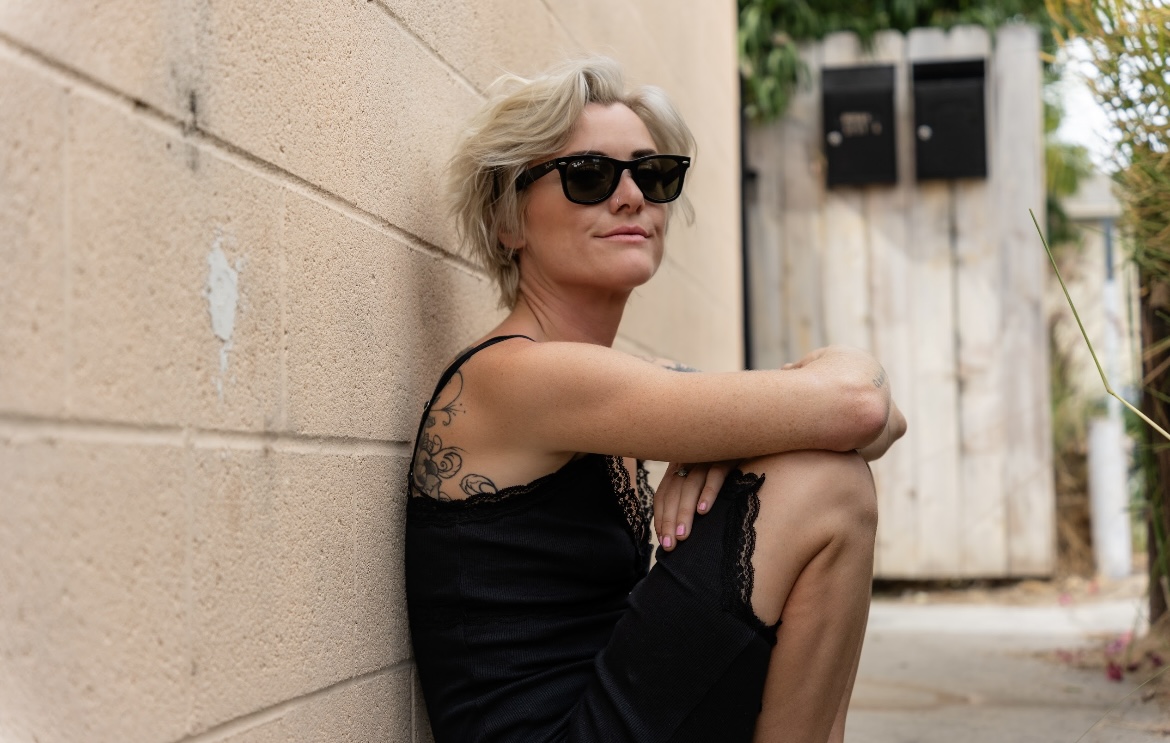
LONG BEACH, Calif. – Emerging from the dynamic music scene of Los Angeles, Juliet Hawkins seamlessly integrates deeply soulful vocals with contemporary production techniques, crafting a distinctive sound that defies conventional categorization.
Drawing inspiration from the emotive depth of Amy Winehouse and weaving together elements of country, blues, and pop, Hawkins’ music can best be described as a fusion–perhaps best termed as soulful electronica. Yet, even this characterization falls short, as Hawkins defines herself as “a blend of a million different inspirations.”
Hawkins’s musical palette mirrors her personae: versatile and eclectic. Any conversation with Hawkins makes this point abundantly clear. She exhibits the archetype of a wild, musical genius while remaining true to her nature-loving, creative spirit. Whether recording in the studio for an album release, performing live in a studio setting, or playing in front of a live audience, Hawkins delivers her music with natural grace.
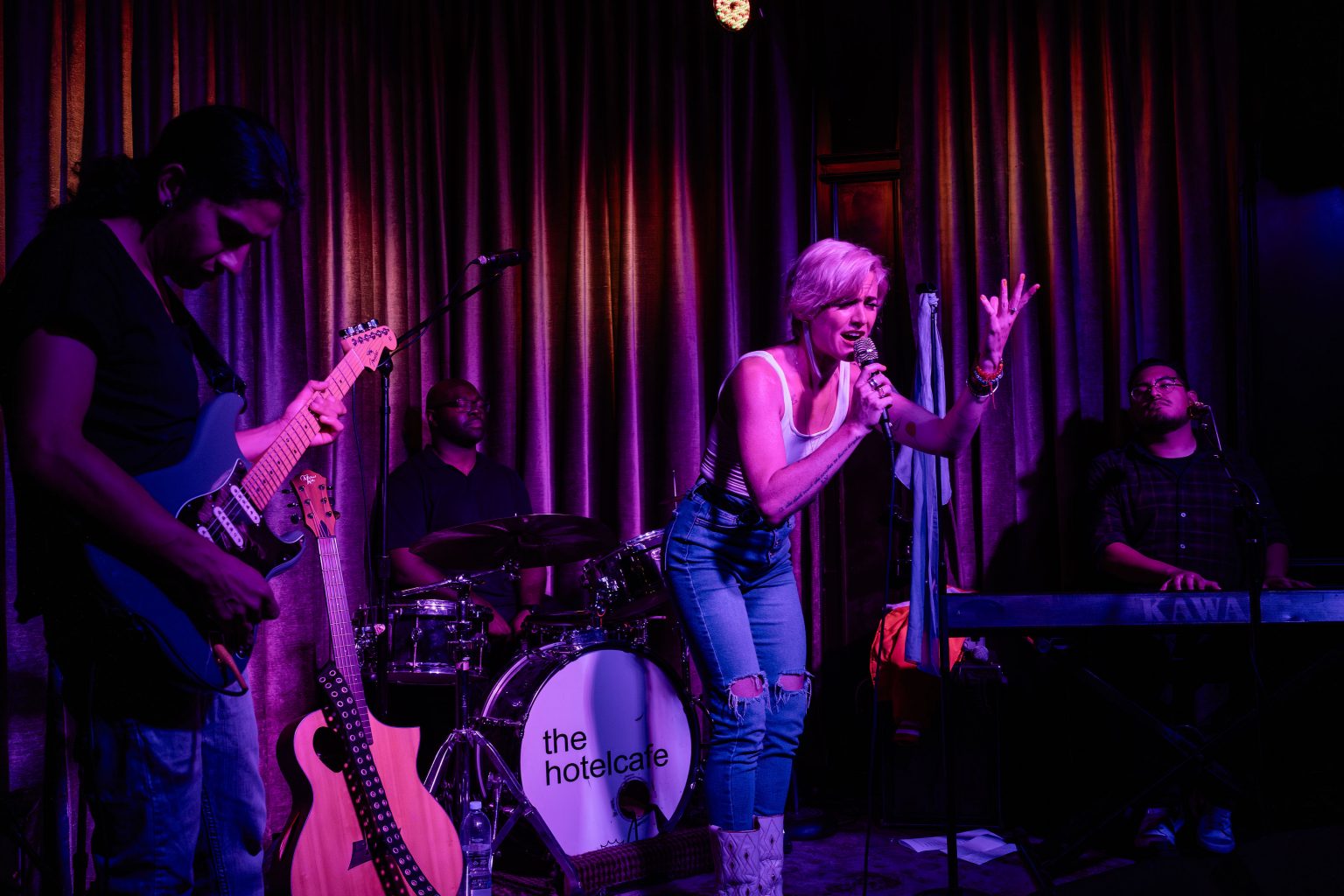
However, Hawkins’s musical journey is far from effortless. Amid personal challenges and adversity, she weaves her personal odyssey of pain and pleasure, transforming these experiences into empowering anthems.
In a candid interview with the Blade, Hawkins spoke with profound openness and vulnerability about her past struggles with opiate and heroin addiction: “That was 10 years ago that I struggled with opiates,” she shared. Yet, instead of letting her previous addiction define her, Hawkins expressed to the Blade that she harbors no shame about her past. “My newer music is much more about empowerment than recovery,” she explained, emphasizing that “writing was the best way to process trauma.”
Despite her struggles with addiction, Hawkins managed to recover. However, she emphasizes that this recovery is deeply intertwined with her spiritual connection to nature. An illustrative instance of Hawkins’ engagement with nature occurred during the COVID pandemic.
Following an impulse that many of us have entertained, she bought a van and chose to live amidst the trees. It was during this period that Hawkins composed the music for her second EP, titled “Lead with Love.”
In many ways, Hawkins deep spiritual connection to nature has been profoundly shaped by her extensive travels. Born in San Diego, spending her formative years in Massachusetts, and later moving to Tennessee before returning to Southern California, she has broadened her interests and exposed herself to the diverse musical landscapes across America.
“Music is the only thing I have left,” Hawkins confides to the Blade, highlighting the integral role that music has in her life. This intimate relationship with music is evident in her sultry and dynamic compositions. Rather than imitating or copying other artists, Hawkins effortlessly integrates sounds from some of her favorite musical influences to create something new. Some of these influences include LP, Lucinda Williams, Lana Del Rey, and, of course, Amy Winehouse, among others.
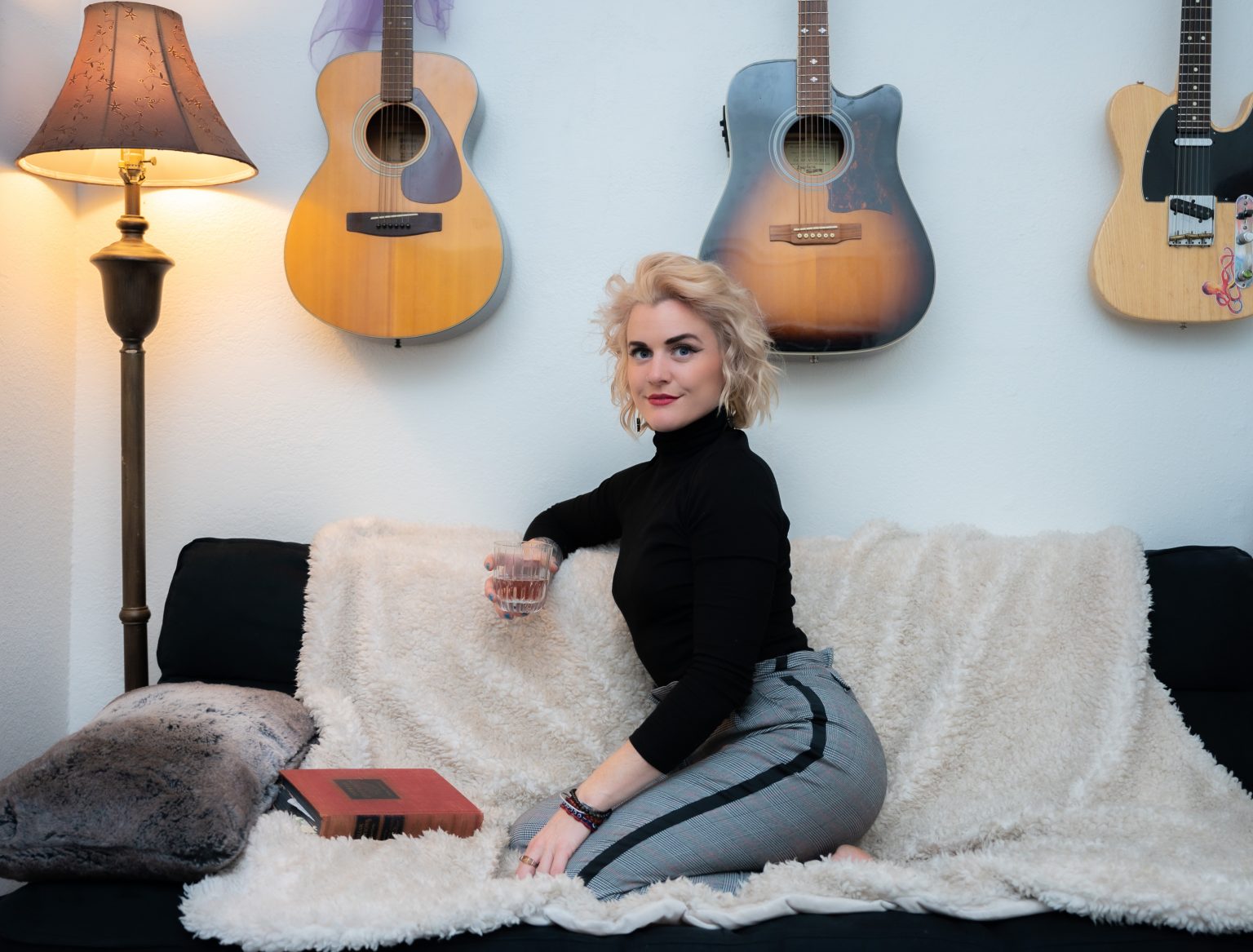
Hawkins has always been passionate about music—-she began with piano at a young age, progressed to guitar, and then to bass, eagerly exploring any instrument she could get her hands on. However, instead of following a traditional path of formalized lessons and structured music theory, Hawkins told the Blade that she “has a hard time following directions and being told what to do.”
This independent approach has led her to experiment with various genres and even join unexpected groups, such as a tribute band for Eric Clapton and Cream. While she acknowledges that her eclectic musical interests might be attributed to ADHD, she holds a different belief: “Creative minds like to move around.”
When discussing her latest musical release — “Stay True (the live album)” which was recorded in a live studio setting — Hawkins describes the experience as a form of improvisation with both herself and the band:
“[The experience] was this divine honey that was flowing through all of us.” She explains that this live album was uncertain in the music’s direction. “For a couple of songs,” Hawkins recalls, “we intuitively closed them out.” By embracing creative spontaneity and refusing to be constrained by fear of mistakes, the live album authentically captures raw sound, complete with background chatter, extended outros, and an extremely somber cover of Ozzy Osbourne’s “Crazy Train” coupled with a slow piano and accompanied strings.
While “Stay True” was a rewarding experience for Hawkins, her favorite live performance took place in an unexpected location—an unattended piano in the middle of an airport. As she began playing Beethoven’s “Moonlight Sonata”, Hawkins shared with the Blade a universal connection we all share with music: “This little girl was dancing as I was playing.”
After the performance, tears welled in Hawkins’ eyes as she was touched by the young girl’s appreciation of her musicianship. Hawkins tells the Blade, “It’s not about playing to an audience—it’s about finding your people.”
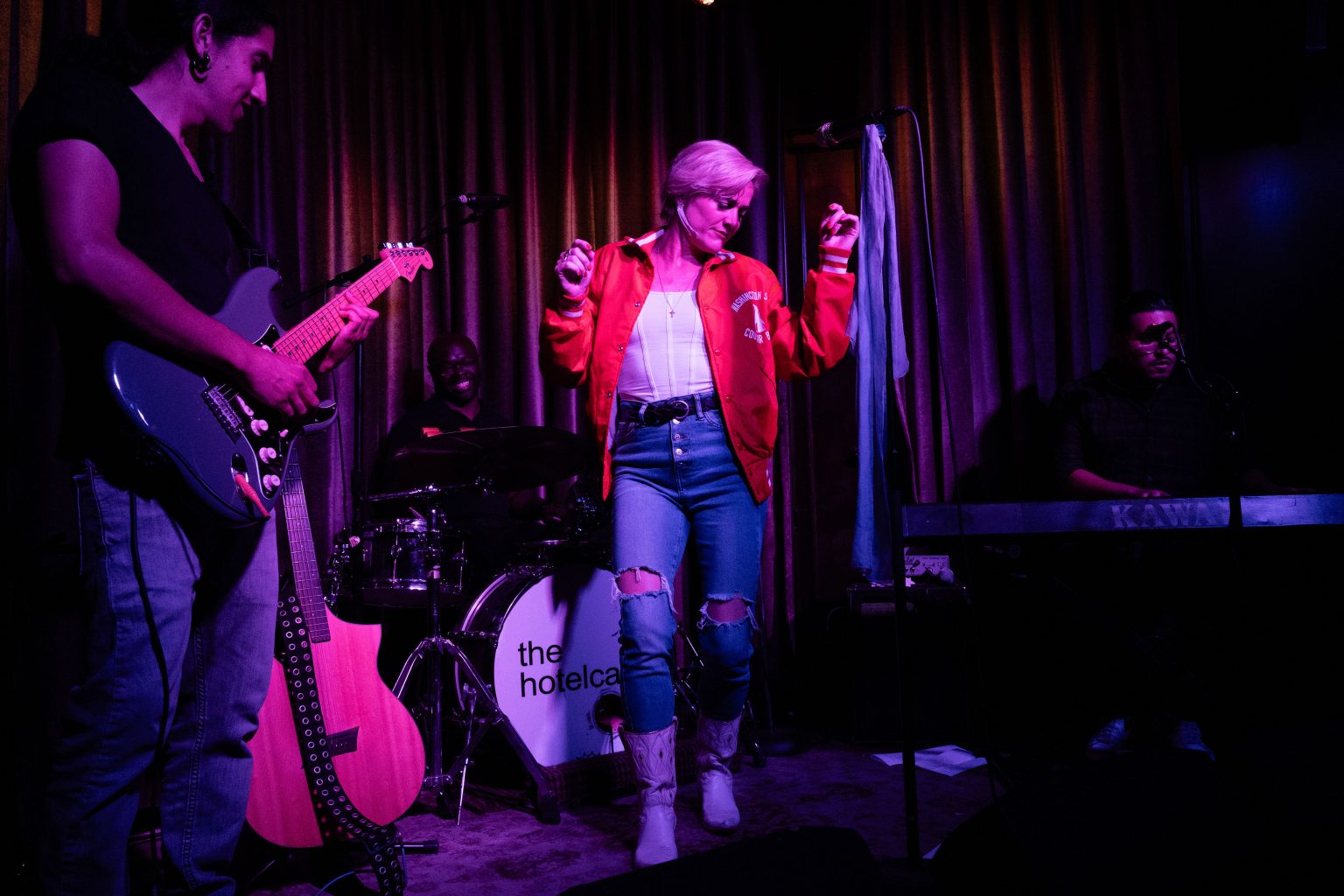
What sets Hawkins apart as an artist is her ability to connect with her audience in diverse settings. She highlights EDC, an electronic dance music festival, as a place where she unabashedly lets her “freak flag” fly and a place to connect with her people. Her affinity for electronic music not only fuels her original pop music creations, but also inspires her to reinterpret songs with an electronic twist. A prime example of this is with her electronic-style cover of Tal Bachman’s 90’s hit, “She’s So High.”
As an openly queer woman in the music industry, Hawkins is on a mission to safeguard artistic integrity. In songs like “My Father’s Men,” she bares her vulnerability and highlights the industry’s misogyny, which often marginalizes gender minorities in their pursuit of artistic expression.
She confides to the Blade, “The industry can be so sexist, misogynist, and oppressive,” and points out that “there are predators in the industry.” Yet, rather than succumbing to apathy, Hawkins is committed to advocating for gender minorities within the music industry.
“Luckily, people are rising up against misogyny, but it’s still there. ‘My Father’s Men’ is a message: It’s time for more people who aren’t just white straight men to have a say.”
Hawkins is also an activist for other causes, with a fervent belief in the preservation of bodily autonomy. Her self-directed music video “I’ll play Daddy,” showcases the joy of embracing one’s body with Hawkins being sensually touched by a plethora of hands. While the song, according to Hawkins, “fell upon deaf ears in the south,” it hasn’t stopped Hawkins from continuing to fight for the causes she believes in. In her interview, Hawkins encapsulated her political stance by quoting an artist she admires:
“To quote Pink, ‘I don’t care about your politics, I care about your kids.’”
When Hawkins isn’t writing music or being a champion for various causes, you might catch her doing the following: camping, rollerblading, painting, teaching music lessons, relaxing with Bernie (her beloved dog), stripping down for artsy photoshoots, or embarking on a quest to find the world’s best hollandaise sauce.
But at the end of the day, Hawkins sums up her main purpose: “To come together with like-minded people and create.”
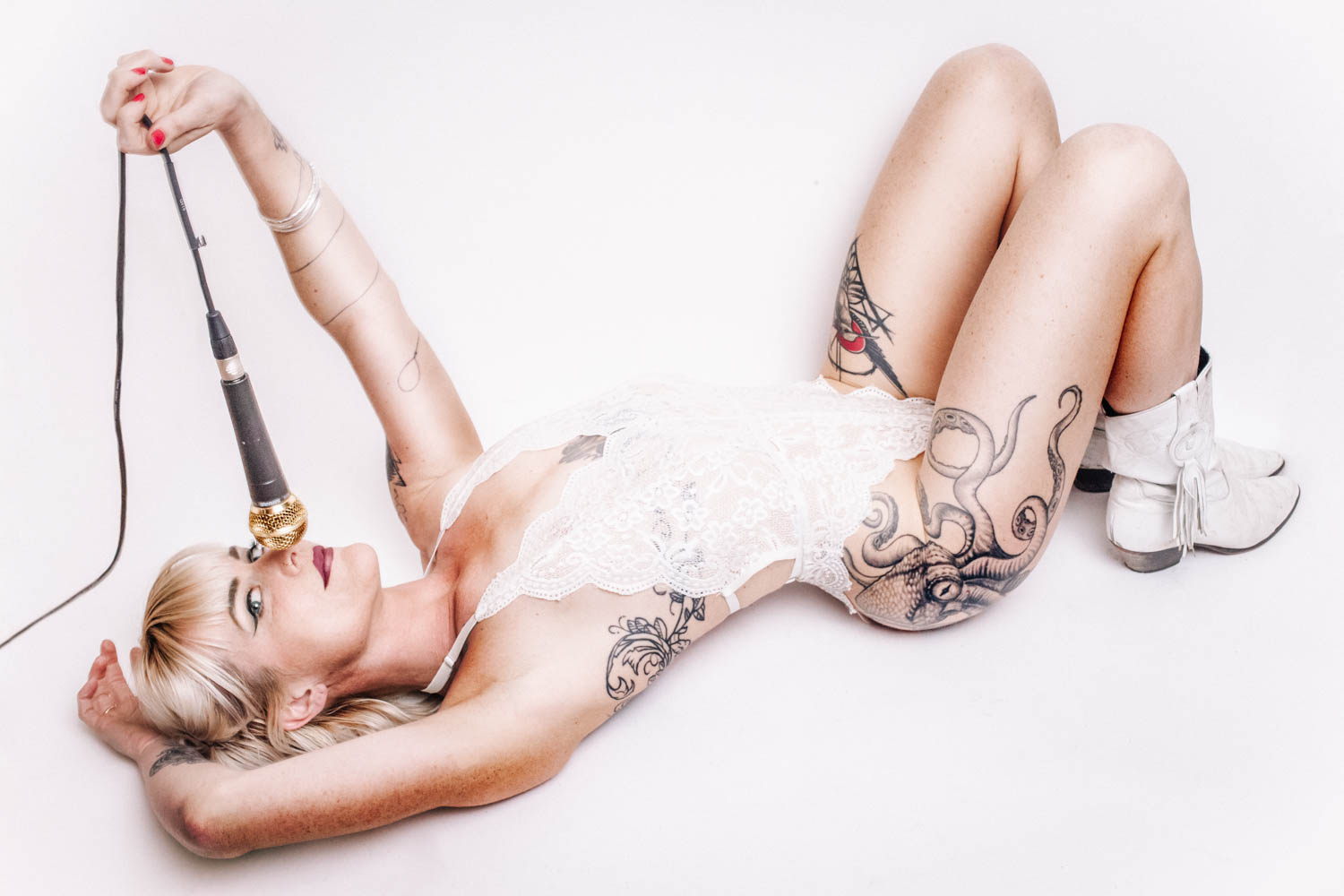
Part of this ever-evolving, coming-of-age-like journey includes an important element: plant-based medicine. Hawkins tells the Blade that she acknowledges her previous experience with addiction and finds certain plants to be useful in her recovery:
“The recovery thing is tricky,” Hawkins explains, “I don’t use opiates—-no powders and no pills—but I am a fan of weed, and I think psilocybin can be helpful when used at the right time.” She emphasizes the role of psychedelics in guiding her towards her purpose. “Thanks for psychedelics, I have a reignited sense of purpose … Music came naturally to me as an outlet to heal.”
While she views the occasional dabbling of psychedelics as a spiritual practice, Hawkins also embraces other rituals, particularly those she performs before and during live shows. “I always carry two rocks with me: a labradorite and a tiger’s eye marble,” she explains.
-

 State Department2 days ago
State Department2 days agoState Department releases annual human rights report
-

 Maryland4 days ago
Maryland4 days agoJoe Vogel campaign holds ‘Big Gay Canvass Kickoff’
-

 Politics3 days ago
Politics3 days agoSmithsonian staff concerned about future of LGBTQ programming amid GOP scrutiny
-

 The White House1 day ago
The White House1 day agoWhite House debuts action plan targeting pollutants in drinking water

